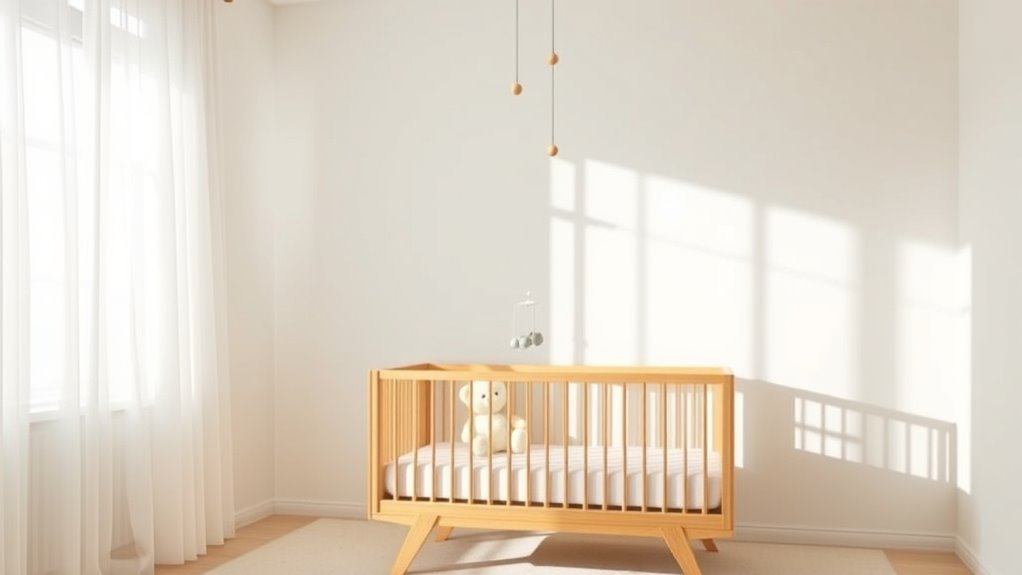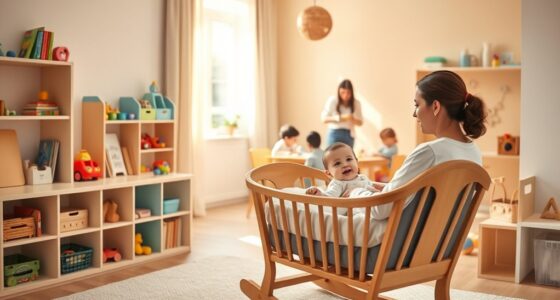You might be surprised how little your baby truly needs to thrive. Focusing on a few essential, high-quality items helps create a calm, organized environment that benefits both of you. Minimalism reduces clutter, lowers stress, and promotes healthier, eco-friendly choices. By prioritizing what’s truly necessary and purposeful, you can enjoy more meaningful moments and foster your baby’s development. Curious to find out how to embrace a simplified parenting style? Keep exploring for helpful tips and ideas.
Key Takeaways
- Babies need only a few essential items; excess clutter can hinder their development and create unnecessary stress.
- Minimalist parenting emphasizes quality, versatile, and eco-friendly products over quantity, promoting a calmer environment.
- Reducing possessions helps parents focus on meaningful interactions rather than managing excessive toys and gadgets.
- A minimalist approach supports a safe, non-toxic space, beneficial for baby’s health and early learning.
- Prioritizing fewer, purposeful items fosters better parenting experiences and teaches children values of sustainability and intentionality.

Have you ever felt overwhelmed by the constant busyness of parenting? Between diaper changes, feedings, and trying to keep up with your little one’s needs, it’s easy to feel like you’re drowning in stuff. That’s where minimalist parenting comes in, encouraging you to rethink what’s truly necessary for your baby’s well-being. One of the key aspects is clutter reduction. When you focus on fewer, high-quality items, you create a calmer environment that’s easier to manage. Instead of filling your space with every possible gadget or toy, you choose only what serves a genuine purpose. This not only reduces chaos but also helps your child develop better focus and appreciation for the things they have. Plus, less clutter means less cleaning and maintenance, giving you more time to enjoy meaningful moments with your baby.
Simplify your space with high-quality essentials to create a calmer, more focused environment for your baby.
Another important element of minimalist parenting is making eco friendly choices. By selecting sustainable, non-toxic products, you’re not just simplifying your life—you’re also protecting the planet your child will inherit. Opt for biodegradable diapers, organic clothing, and toys made from natural materials. These choices often last longer, are safer for your baby’s sensitive skin, and contribute less to environmental waste. When you embrace eco friendly options, you’re teaching your little one the importance of caring for the environment from an early age. It’s a way to align your parenting style with values of sustainability and responsibility, all while reducing the number of unnecessary items cluttering your home. Additionally, understanding projector contrast ratio can help in creating a peaceful, visually comfortable environment for your family.
Simplicity in parenting also means resisting the pressure to buy every new product marketed as essential. Instead, you focus on what truly benefits your child’s development and happiness. This approach encourages you to invest in versatile, durable items that can serve multiple purposes. For example, a simple wooden toy can grow with your child, providing entertainment and educational value over time. It’s about shifting your mindset from accumulation to intentionality—choosing quality over quantity. As you pare down your belongings and make eco friendly choices, you’ll notice your home becoming more peaceful and your mind clearer. The extra space and simplicity can give you a sense of freedom, allowing you to focus on what matters most—building a strong, loving connection with your baby.
Minimalist parenting isn’t about deprivation; it’s about creating a nurturing environment where less truly is more. When you embrace clutter reduction and eco friendly choices, you’re fostering a sustainable, calm, and intentional way to raise your child. It’s a mindset shift that benefits your entire family, making parenting more manageable and more meaningful.
Frequently Asked Questions
How Do Minimalist Parents Handle Emergencies Without Excess Supplies?
In emergencies, you focus on essential items, practicing good emergency preparedness without excess. You keep a well-organized, minimal supply of supplies like diapers, wipes, and basic first aid, knowing exactly where they are. Effective supply management means you can quickly access what you need without clutter. You also have a plan in place, like knowing emergency contacts and safe spots, so you’re ready without overstocking.
Can Minimalist Parenting Work With Multiple Children?
Imagine you have three kids, and you wonder if minimalist parenting works with multiple children. It can, if you encourage sibling cooperation and shared responsibilities. For example, older siblings can help with daily routines, fostering teamwork. You focus on essentials, reducing clutter, and promoting independence. By setting clear boundaries and involving everyone, minimalist parenting becomes manageable and enriching, helping your children learn cooperation and resilience without excess stuff.
How Do I Introduce Minimalism to Family Members or Caregivers?
When introducing minimalism to family members or caregivers, start with clear family communication. Share your reasons and goals, emphasizing how it benefits everyone. Set boundaries by explaining what items or routines are essential and which aren’t, encouraging respect and cooperation. Be patient, listen to their concerns, and involve them in decluttering or simplifying. This approach fosters understanding, cooperation, and helps everyone adapt to a more minimalist lifestyle.
What Are the Best Resources for Minimalist Parenting Tips?
You want the best resources for minimalist parenting tips, focusing on clutter reduction and budget-friendly ideas. Start with books like “The Minimalist Mother” or “Clutter-Free Parenting,” which offer practical advice. Follow blogs and online communities dedicated to simple living and parenting, like The Minimalists or Zero Waste Family. These provide actionable strategies to cut clutter, save money, and create a calmer environment, making your parenting journey more mindful and manageable.
How Does Minimalist Parenting Affect a Child’s Social Development?
You might find that minimalist parenting gently nurtures your child’s social development. By focusing less on material things, your little one can develop greater child independence and enjoy more meaningful peer interactions. This approach encourages your child to build confidence, communicate effectively, and connect authentically with others. As a result, your child grows into a well-rounded individual, thriving in social settings without the distraction of excess possessions.
Conclusion
In the end, embracing minimalist parenting isn’t about sacrificing essentials but about trusting your instincts and simplifying your life. You don’t need a mountain of toys or endless gadgets to raise a happy, healthy baby—sometimes less truly is more. By focusing on meaningful moments rather than material clutter, you create a nurturing environment that’s richer than any store-bought item. Remember, you’re the best parent your child could ever ask for—more powerful than a thousand shiny, unnecessary things.










